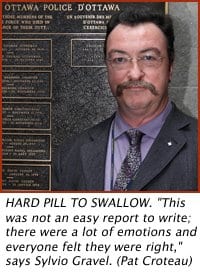Four months ago, Ottawa police Chief Vern White called Staff Sergeant Sylvio Gravel into his office. White asked Gravel to form a team, ultimately of four members, to review the mechanism that helps gays, visible minorities and women join the Ottawa Police Services.
Rumblings among the police’s rank and file, which Gravel acknowledges were impossible to ignore, centred around complaints about the Outreach Recruitment team, a year-old initiative designed to make the force “reflective” of the community.
Recruitment is the cornerstone of the Ottawa police reputation as being relatively progressive and gay-positive.
Gravel found that members of Outreach Recruitment were “being blamed for all the ‘bad’ hires that had occurred over the past three years even though they had only just started their work and hadn’t had a hand in hiring anyone yet. It was alleged that they were cheating, manipulated, bullying, threatening and even stealing information to get their candidates through,” says Gravel in the 89-page report released in Nov 2007.
The rumours were, as it turns out, unfounded, according to Gravel.
“We found no indication of any of that,” he tells Captial Xtra. “What we did find is that there was a misunderstanding of what the recruiting team was doing.”
Still, the report shows that frontline officers are deeply distrustful of how recruiting happens.
Distrust was bred by the recruiter’s goal — to be accomplished in one year — of hiring at least 33 percent women, 33 percent visible minorities and up to 33 percent white males, with no maximum on the first two.
For a force staffed by white men to the tune of 85 percent, it will realistically take many years of recruiting to correct the gender and race imbalance. But Gravel’s report recommends removing the hiring cap on white men, because of the potential for it to be discriminatory.
“At no point did we ever say that we would accomplish this by excluding certain groups,” he says. Under the current rules “even zero [white men hired] would be a possibility. That hasn’t happened, but it’s a possibility.”
The gay head of the Police Liaison Committee to the queer community, Darryl Lim, supports this and other contentious recommendations in the report.
“I especially like the section on understanding the difference between equity and equality,” Lim says. “Having a quota system is not really living, or advocating, diversity. The Ottawa Police should review the process to make sure it’s equitable, it’s transparent.”
Lim says he was briefed about the report at the time of its release.
“I think it’s needed. I think it’s good that the report came about,” he says.
Gravel hopes that better communication will correct the perception that the force is lowering its standards by hiring gays, women, and visible minorities. It’s among the most troubling beliefs held by the front line officers.
“It was a misunderstanding of how the mentoring program worked,” says Gravel. “People felt they were being fed answers.”
Lim echoes that.
“I have an issue if we’re not going to hire the most qualified candidate,” says Lim. “Right now, members in the service feel — and maybe that’s not communicated — that it’s not an equal playing field.”
But the report goes even further to address the perception problem among average cops. A series of recommendations, all of which were officially accepted by Chief White in December, will reduce the status of the recruitment effort.
They include:
- removing the rank of inspector from the head of the recruitment team;
- collapsing the recruitment team into the resourcing team;
- adding more staff on the recruitment side;
- reducing the scope of the recruitment team’s mandate.
Inspector Kai Liu, the former head of Outreach Recruitment, has already been removed from the unit. Recruitment will be headed by Micheal Ryan, a staff sergeant in human resources.
But Gravel doesn’t see the report as critical.
“The recommendations should not be seen as a weakening of the outreach team,” he says. “This is about admitting that it could have been done better.
“In fairness, it takes a lot of guts to admit it a mistake.”
Lim says that the report’s recommendations and Liu’s removal doesn’t constitute a defanging of the outreach team.
“I don’t think so. The report is just being really honest,” he says.
On the whole, Lim insists that the report be taken in a positive light.
“This Outreach Recruitment unit has worked for the queer community,” says Lim. “The evidence of that is that we have members of the community who are now members of the Ottawa Police. These aren’t just queer people, they are people with valuable skills. They’ve opened up the doors to people from communities where people hadn’t considered a job with the police before.”
Joanne Law, a high profile and longtime member of the Police Liaison Committeee reached for comment, had not been informed of the report by either Lim or the force. After receiving the document, she says she’s still hesitant to comment on it until she finds out more from her police contacts.
Gravel’s report details how the Outreach Recruitment team and its complement, the Resourcing Unit, locked horns in the struggle to implement the force’s ambitious hiring goals. It shows how both units became “frustrated” — a frustration that spilled over into the rest of the police and which predates the Outreach Recruitment team.


 Why you can trust Xtra
Why you can trust Xtra


